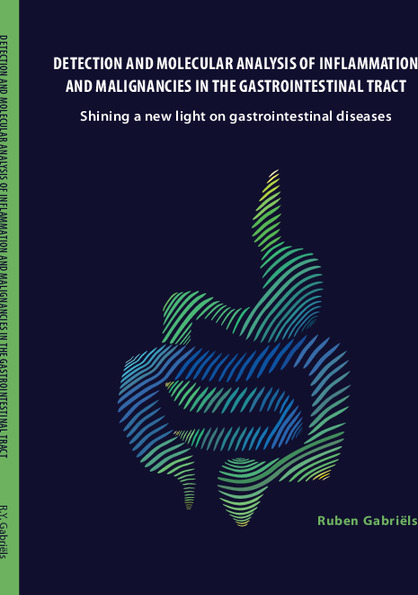Upcoming: PhD defense Ruben Gabriëls

Ruben Gabriëls will defend her PhD on the 29th of May at 12:45, at the academy building of the University of Groningen. The title of his thesis is: “Detection and molecular analysis of inflammation and malignancies in the gastro-intestinal tract.” The online defense can be followed via this link and the thesis can be found online.
Abstract
Esophageal cancer is often diagnosed at an advanced stage, making it one of the most deadly forms of cancer. Early and accurate detection of (pre-stages of) esophageal cancer is crucial. The tumor can be completely removed through endoscopic examination in the early stages. Patients with chronic acid reflux in the esophagus are at a higher risk of developing esophageal cancer due to chronic inflammation, known as Barrett’s esophagus. Currently, patients with Barrett’s esophagus are regularly examined through a gastroscopy. The esophagus is examined for tumors and precursors of this disease. Despite regular endoscopic procedures, flat/subtle esophageal cancer abnormalities are often missed.
Chronic intestinal diseases, also known as inflammatory bowel diseases (IBD) such as Crohn’s disease and Ulcerative Colitis, are relatively common in the Netherlands. IBD patients experience daily symptoms such as diarrhea, incontinence, abdominal cramps, blood in the stool, and severe fatigue. Currently, there is no cure for IBD. The disease activity and the effectiveness of treatment are assessed through endoscopic examination. Endoscopic examination is costly and unpleasant for the patient. To improve the quality of life for IBD patients, new techniques that eliminate the need for endoscopic examination need to be developed. Further research is also needed to understand the precise mechanisms of medication for IBD patients and predict their effects.
This thesis describes innovative insights into both fluorescence endoscopy and new biomarkers to improve the quality of life for IBD patients. For the first time, we demonstrate how vedolizumab, a medication for IBD, moves through the body of an IBD patient and to which cells it binds. This has provided us with more understanding of the mechanism of action of this medication. Furthermore, this thesis presents promising results regarding the diagnostic accuracy of invisible esophageal cancer abnormalities in patients with Barrett’s esophagus using fluorescence endoscopy.

